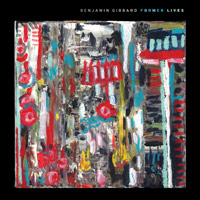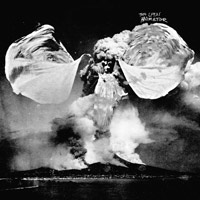
Former Lives
Barsuk
I have to admit that even before sitting down to listen to Death Cab for Cutie frontman Benjamin Gibbard’s debut solo album, I already had the plot line all mapped out in my mind. It went something like this: After reaching new heights of popularity playing bittersweet pop with Death Cab, Gibbard retreats from the spotlight to record an achingly personal record to address the disintegration of his marriage to Zooey Deschanel. Sounds about right, right?
Well, that’s not exactly how the story played out. For one, Deschanel appears on on Former Lives, contributing vocals to the mariachi-flavored “Something’s Rattling (Cowpoke).” More importantly, though, Former Lives isn’t any more tear-stained than anything else in the Gibbard songbook. In fact, there’s a pervasive sense of detachment that causes the record to seem far less sentimental than an album like, say, Transatlanticism. On “Teardrop Windows,” for example, Gibbard sings, “He is all alone and wondering why,” the third-person point of view perhaps lending the distance he needs. “Duncan, Where Have You Gone?” works in a similar way, with Gibbard singing, “Do you feel like you don’t really know yourself?” and obviously projecting something of his own feelings onto the song’s protagonist.
While the approach may leave some pining for Gibbard’s woe-is-me persona of old, the use of such songwriting devices isn’t the problem with Former Lives. What is more problematic is the sonic MO at work here. Without his Death Cab bandmates, Ben slips into a pool of lukewarm adult-contemporary aesthetics. It’s no surprise then that Aimee Mann contributes to “Bigger Than Love,” but that is actually one of the album’s strongest moments. On his own for much of the record, Gibbard stays in a comfort zone of middling folk-rock that’s far less interesting than Former Lives’ lyrical content. For the most part, though, Gibbard seems to have played it safe in every sense, neither sticking his neck out lyrically nor challenging himself musically.
Stephen Slaybaugh

Animator
Dead Oceans
The Luyas hail from the indie-rock goldmine known as Montreal. Formed in 2006, the foursome perfected a sound reflective of this environment, rife with buoyant creativity, as manifested on 2011’s Too Beautiful to Work. Their third full-length, however, takes a comparatively morose and surprisingly satisfying turn. Animator finds the band in a state of reflection. Recorded after the death of a close friend, the album’s catalyst is evident in the somber tone, beginning with the first track, the nearly nine-minute long “Montuno,” whose various parts are laced with doleful strings. It’s a sweet, sad introduction in which frontwoman Jessie Stein’s breathy vocals spout lyrics like, “It gets harder, harder, harder every day,” with a studied fragility. Though many of the tracks follow this formula, there are a few that deviate, namely the post-punk influenced “Fifty Fifty,” with its punctuated drum beats and Echo and the Bunnymen–esque melodies.
Though the band is a cohesive effort among four individuals, the real standout on this album is Stein, whose ethereal, high-pitched vocals are reminiscent of Blonde Redhead’s Kazu Makino. In fact, seveal of the songs (“Face” and “Traces”) come off as tame adaptations of Blonde Redhead, which isn’t necessarily a bad thing. Not all of the songs are memorable, and truthfully, many blend together. There are some cheesy elements (laser sound effects on the relatively minimalist “Earth Turner”), but nevertheless Animator is driven more by atmospheres and soundscapes than gimmicky pop hooks. In the end, it’s clear this album was truly a labor of love.
Jennifer Farmer

Burning Daylight
Dais
King Dude has been plying his brand of darkened crossroads Americana for a few years now, and Burning Daylight stands as another signpost on that accursed intersection. You can almost hear the charred ground crunch under TJ Cowgill’s boots in these songs, as there’s a sooty undertone that drifts in as the songs begin and then lies latent until the end when it carries the silence into the next song. However, looming atop this coal black cloud, there is something amiss.
While similarities to Lee Hazelwood and Leonard Cohen have been noted elsewhere, short of the fact that this album contains recorded sounds, they are fallacious and nothing more. King Dude’s affected vocal baritone warbles around the melody, and he comes oh so close to resembling the old folk and dirge blues he’s trying to emulate. But his lack of sincerity insulates him from successfully landing in that sacred land of timelessness. While he does pepper the album with interesting melodies, he often destroys them with an off-key moan. It’s as if he’s uncomfortable with the quality of his voice, and thus must undermine it in some way. While that impertinent tone can work when it’s done with a knowing wink (a la Cohen), when it’s done in ironic jest, it takes any sort of credibility that could have been there away from the music. It’s a shame because this stuff is compelling and engaging, especially on the fragile lament of “You Can Break My Heart,” where Cowgill pleads to “just please don’t break the rest of me.” But on songs like “Vision in Black,” “I’m Cold” and “Jesus in the Courtyard,” it’s only that damn warble that pushes the listener away. Maybe next time he’ll pick the correct turn in the crossroads and we’ll get the dose of hell we really wanted and came almost close enough to feel its heat.
Michael P. O’Shaughnessy

Deleted Scenes
Weightless
If the casual music fan puts any thought into how an album is made, they would likely assume that an artist writes enough songs to fill a CD then records them. The truth of the matter is that there can be a huge amount of songs that are recorded just to be whittled down to the actual album. In the case of Blueprint’s 2011 album, Adventures in Counter-Culture, the balance went to 75 songs recorded versus the 15 that made the record. As for the ones left on the cutting room floor, 15 of those are seeing the light day on the Columbus MC and producer’s new release, Deleted Scenes.
Due to the nature of the record, it is tempting to place Deleted Scenes in the odds-and-sods category. The fact that the album is coming out on Blueprint’s own Weightless Recordings instead of Rhymesayers may add to the perception that Deleted Scenes is more of a stop gap than a proper album. Instead, this record should be seen as the Amnesiac to the Kid A of Adventures. The comparison is even more apt when you consider how hard a turn Kid A was for Radiohead. Adventures was a change-up as far as production and performance style for Blueprint, and it caught many people off-guard. (To further cement the comparison, Deleted Scenes closes with Amnesiac’s opener, “Packt Like Sardines in a Crushd Tin Box.”) Deleted Scenes builds off the experimental bones of its predecessor, so there is a mix of straight ahead rap songs, sci-fi electro productions, and R&B-influenced crooning. While this record does stand alone, without the proper context, it might be a little jarring.
Where Deleted Scenes succeeds is in how well it’s balanced. From storytelling joints to robust rhyming, Print the rapper is in fine form. In addition, crooner Blueprint seems to make an increasing amount of sense, as evidenced on “Senseless,” which has a John Legend meets The XX vibe. Taken as a whole, it is remarkable how well it all works together. The only minor speed bump is “Bells and Whistles,” which sonically feels jarring in its place on the record. Deleted Scenes shows that the songs on Blueprint’s backburner are as strong as his first string.
Dorian S. Ham

The Wilderness
Lefse
While it can feel a bit disingenuous when a gaggle of Williamsburg trust-funded kids are channelling their ennui into hazy tufts of sonic navel-gazing, the malaise that Buffalo denizen Kyle Reigle channels into his Cemeteries project is recognizably sincere, or at the very least, channeled with a good deal more deftness than his contemporaries. His full-length debut, The Wilderness, while hinting at signifiers from both goths of yore and ’90s shoegazers, still bears an unsettling sound of its own, derived from both the synth touches that pervade the record and its overall gloomy cadence.
“Young Blood,” which leads off the record, melds lilting melodies with lyrics about being watched and feeling cold and hollow, its sense of desolation feeling neither studied or affected. Indeed, as also conveyed visually on the album’s cover and hinted at by its title, The Wilderness is more concerned with the dark places that occur both in natural environments and the corners of one’s mind. With Reigle’s voice obfuscated just enough to take some effort to make out the album’s lyrics, the record occupies a shadow of its own, even when sparkling notes ring out from the darkness on songs like the title track. Though the album’s aesthetic is unquestionably melancholy, it’s hard not to feel a little cheered by its very existence.
Stephen Slaybaugh
MP3: “Young Blood”
ALBUM REVIEWS
Tame Impala, Lonerism
Moon Duo, Circles
AC Newman, Shut Down the Streets
Beth Orton, Sugaring Season
John Cale, Shifty Adventures in Nookie Wood
The Vaccines, Come of Age
Band of Horses, Mirage Rock
Fac. Dance 02: Factory Records 12" Mixes & Rarities 1980-1987
Van Morrison, Born to Sing
The Soft Pack, Strapped
Ben Folds Five, The Sound of the Life of the Mind
Dan Melchior, The Backward Path
Adrian Crowley, I See Three Birds Flying
Robert Pollard, Jack Sells the Cow
